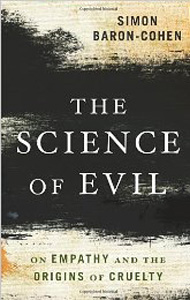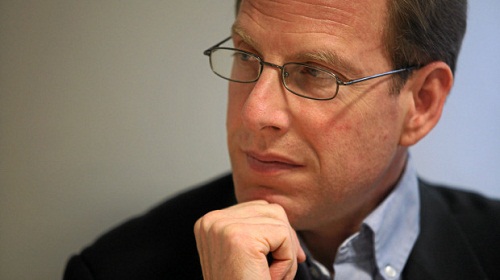- Learn The Difference Between Cognitive And Affective Empathy
- Hear Simon Baron Cohen’s Thoughts on Mirror Neurons
- Discover Simon Baron Cohen’s Views On Theory Of Mind And Empathy
Full Interview Audio

Personal Info
Favourite Books:
- The Intentional Stance by Daniel C. Dennett
Most Influenced By:Jerome Bruner, John Bowlby
Twitter: http://twitter.com/sbaroncohen
Organization Website: http://autismresearchcenter.com
Interview Highlights
This is a condensed, lightly edited transcript of an audio interview. The full audio is available and highly recommended. The interviewee may post clarifications in the comments.
Adrian Bye: I’m here with Professor Simon Baron-Cohen, who is from Cambridge University and is pretty well known as an autism researcher. Simon has published a lot of books and has an interesting cousin named Sacha. Simon, thanks for joining us.
Simon Baron-Cohen: Thank you for having me on your show.
Adrian Bye: Tell us a little bit about who you are and where you come from.
Simon Baron-Cohen: I’m working at Cambridge University, and I am the Director of the Autism Research Centre. I’ve been here since 1994, and we’ve built up a very multidisciplinary group of neuroscientists, geneticists, developmental psychologists, and some clinicians too. I did my Ph.D. at the University College London with Uta Frith, who will be known to many of your listeners as a very eminent autism researcher.
Adrian Bye: Yes, I read her book. I guess you studied with her and with Tony Attwood.
Simon Baron-Cohen: Yes, I did, Tony was another one of Uta’s Ph.D. students.
Adrian Bye: Now, you take some fairly controversial positions, and you have this cousin who is an actor who takes fairly controversial positions. What is your comment on that?
Simon Baron-Cohen: It’s a fun question, but I don’t tend to really talk about Sacha, just because of wanting to respect his privacy. I respect his work, I think he does get into controversy largely because he is using comedy to try and expose some serious issues in society.
Adrian Bye: The biggest question I’ve been interested to talk to you about is the concept of empathy which you’ve brought down to the two better definitions, which is cognitive empathy and affective empathy. In your book on the origins of evil you marked autism and Asperger’s as both being cognitive empathy and affective empathy negative; and recently you’ve changed your feeling that Asperger’s syndrome may in fact be cognitive empathy negative, whereas affective empathy is positive.
Simon Baron-Cohen: The evidence for difficulties in cognitive empathy in autism and Asperger’s is quite well established. That part is more clear-cut, whereas the evidence for difficulties in affective empathy is less clear, and in my book I was suggesting that there might be difficulties in both in people on the autistic spectrum.
It’s too early to say what the status is of affective empathy in autism because there have been too few studies. Increasingly, I’m seeing evidence for intact affective empathy. I’m arguing that it’s not clear-cut in the case of affective empathy.
Adrian Bye: So, do you confidently put the check marks in affective empathy positive for Asperger’s?
Simon Baron-Cohen: I’ve seen some studies recently that affective empathy may be intact. There are some other ones which are suggesting the opposite. Currently I’m leaning towards saying that in Asperger’s syndrome affective empathy is intact; at least that’s to say it’s not clearly impaired.
Adrian Bye: How do you research something like that?
Simon Baron-Cohen: I might start from a clinical perspective rather than a research perspective. Often I meet people with Asperger’s syndrome, and if they hear about somebody else suffering they often get very moved by it and want to stand up and do something about it. To me that does reflect good affective empathy.
It could be that somebody has been unfairly treated at work; whereas many so-called neurotypicals would just turn a blind eye because it doesn’t directly affect their situation, someone with Asperger’s syndrome might stand up for the victim. Another example might be that they have heard that somebody’s pet cat has died and they’ll want to make some kind of gesture of sympathy. Hearing about other people’s situations often does trigger a heightened empathic response in people on the autistic spectrum.
Adrian Bye: Some of the experts here in New York said that’s not real empathy, that’s sympathy. I disagree and I’m interested that you make that distinction too.
Simon Baron-Cohen: I see sympathy as a subset of empathy, so empathy is all about identifying and responding to another person’s mental state. Sympathy is a subset because it’s about how you identify and respond to another person’s pain.
Adrian Bye: I was profoundly amazed when I got explained the concept of sympathy and empathy, but it feels like saying that those of us on the spectrum don’t actually feel things.
Simon Baron-Cohen: I would agree with you that that’s not an accurate description of people with Asperger’s syndrome. People with Asperger’s syndrome have feelings about other people’s suffering and state of mind. That’s why I wanted to make a very clear statement that affective empathy could be seen as intact.
The evidence for difficulties with cognitive empathy is stronger evidence-based. But affective empathy is a new area, and it is important that we have more research.
Adrian Bye: I think empathy is an awful word.
Simon Baron-Cohen: I see the term empathy as useful in picking out a human psychological process, but it’s a complex process and there are lots of parts to it. So, with language you can talk about syntax or vocabulary; there are lots of different components. Nevertheless, there is something valuable in having these overarching psychological constructs.
Adrian Bye: I can just tell you my story that I was diagnosed; it was pretty terrible and I actually started to become suicidal. I got through it and have re-evaluated my identity, but it’s been tough.
Simon Baron-Cohen: I think there may be people out there who have had a similar experience. I work in a clinic where people come to find out if they might have Asperger’s syndrome, but we always check if they want a diagnosis. Most of the people that we see have been having a hard time, and they are finding their way to a clinic to get an understanding of their difficulties. They want a diagnosis because they see it as a sort of passport to getting support and services and greater self-understanding.
Adrian Bye: You have two important concepts: we have talked about empathy and the other one is Theory of Mind. Could you give us a definition of Theory of Mind?
Simon Baron-Cohen: I would define it as the ability to attribute thoughts and feelings and intentions and emotions to other people different to your own. So, being able to separate your own state of mind from somebody else’s, keeping track of what they know and what they don’t know. That would probably these days also be called cognitive empathy. The evidence is that people with classic autism have severe difficulties in this area, so they may not stop and think whether other people believe the same as them. They have difficulty even trying to imagine what someone else’s point of view is.
That’s the case for classic autism. In Asperger’s syndrome the evidence seems to be that there are delays in this ability. Whereas for a typical child you see some evidence of Theory of Mind by about three or four years old, for kids with Asperger’s syndrome they often do come to understand other people have different perspectives but they may not develop that understanding until many years later than is typical.
Adrian Bye: About a year and a half ago I took a trip to North Korea. If we were in the countryside in northern North Korea, and I introduced you to let’s say a 22-year-old girl, how much Theory of Mind would you have with her?
Simon Baron-Cohen: You’ve described a very good situation because both you and I would be culturally outsiders. Nevertheless, the idea is that whether you are in your own culture or visiting someone else’s culture, Theory of Mind is constantly working; you are constantly trying to figure out what is she trying to say, what is her meaning, how is she understanding the situation.
Adrian Bye: So even with this North Korean 20-year-old girl, are you going to have much insight into what she’s thinking?
Simon Baron-Cohen: The best you can do is make inferences or speculations based on what you know about her background; but you can read the situation even non-verbally. Some people argue it’s based on this exercise of putting yourself into someone else’s shoes.
I suppose what the research does is to look at how developed is a person’s Theory of Mind and is it developed to the level that would be seen in somebody without a diagnosis? That’s where researchers have had to devise new methods for measuring Theory of Mind. We have developed a test where we had to look at photographs of people’s eyes to try and infer quite subtle information about somebody else’s state of mind just from their emotional expressions around the eyes.
Adrian Bye: I did that; some of those facial expressions are quite difficult. I want to move on because I really want to ask you about the topic of mirror neurons. What are your thoughts on mirror neurons?
Simon Baron-Cohen: There has been a lot of interest in whether mirror neurons can explain why the typical person develops empathy, and maybe why people in the autistic spectrum have difficulties with some aspects of empathy. In my book, I went through the evidence from the neuroscience about which parts of the brain are involved when we empathize with another person. Some of those regions in what I call the empathy circuit do contain mirror neurons, so I think that mirror neurons may well be important as part of understanding empathy. But, I am not sure that they are all they are hyped to be.
First of all, mirror neurons are proposed to explain things like imitation. You find that some people with autism despite the difficulties in social understanding can have excellent imitation. That is true even in classic autism where the person may develop echolalia; they can repeat what they have heard from someone else’s speech, so their imitation is very exact. If they had difficulties with their mirror neuron system you might expect that they wouldn’t be able to imitate other people.
Adrian Bye: It could be that there are multiple sets of mirror neuron groupings in the brain and depending on your severity of impairments more or less of them are not functioning right.
Simon Baron-Cohen: One of the challenges for research in this area is you have to specify exactly where are these mirror neurons. But this field doesn’t have a good consensus, so for some researchers there are large parts of the brain which involve mirror neurons and it seems to be something that is extending all the time. The danger is that if the whole brain involves mirror neurons then is it really giving us any explanatory power?
Adrian Bye: The mirror neuron guys would say Theory of Mind and empathy are just trailing indicators of problems with mirror neurons. How would you respond to that?
Simon Baron-Cohen: There are several ways to respond. One is that mirror neurons we should remember were first discovered in nonhuman primates, in monkeys, and yet monkeys have quite a limited Theory of Mind. They have got the mirror neurones, but itself that doesn’t seem to be sufficient as a prerequisite for developing a Theory of Mind that we see in humans.
Adrian Bye: But we know the mirror neurons exist in humans?
Simon Baron-Cohen: Even that statement we have to be a bit careful about because in the monkey research they have electrodes implanted into the monkey’s brain measuring whether a very specific neuron or a cluster of neurons fire. In the human case we don’t tend to do that kind of invasive research for obvious ethical reasons. We tend to use other kinds of technology like MRI and particularly FMRI – functional magnetic resonance imaging. That doesn’t have the resolution to look at individual neurons or even clusters of neurons. So, when people talk about mirror neurons in the human brain it’s not a very precise description.
Adrian Bye: But there could be a link between cognitive empathy and mirror neurons?
Simon Baron-Cohen: I would like to see a more imaginative and ethical way to test the mirror neuron theory in the case of autism. I think the term spectrum is really useful not just in relation to the autistic spectrum but also the empathy spectrum: it’s all about degrees and having a quantitative approach.
Adrian Bye: Quick question from WrongPlanet: one of the users wanted to ask me to ask you about empathy and motivation. Why is it that in some situations people can have temporarily increased empathy?
Simon Baron-Cohen: We have already said that empathy is quite complex; there are lots of factors that can influence it, including your current state. We know that people on the autistic spectrum often have quite a lot of sensory issues too. If you are overwhelmed by hypersensitivity, which is what a lot of people on the autistic spectrum report, tactile information may be uncomfortable, even their clothes may feel uncomfortable against their skin. We just don’t know how much it can interfere with somebody’s capacity to empathize.
Adrian Bye: Do you think though that people are being almost neurotic in finding the sensory issues that aren’t there?
Simon Baron-Cohen: Certainly I have seen people on the autistic spectrum, including people with Asperger’s, find it overwhelming. What I am also impressed by is that some people with Asperger’s and autism are aware of the difficulty and they take steps to think “how I can cope”, like wearing ear defenders.
Adrian Bye: Do you have anything you want to tell us before we wrap up?
Simon Baron-Cohen: One thing I would love to say is that this has been really nice to have a dialogue. I am not alone in saying that researchers encourage that. I am happy that we have had that opportunity.









